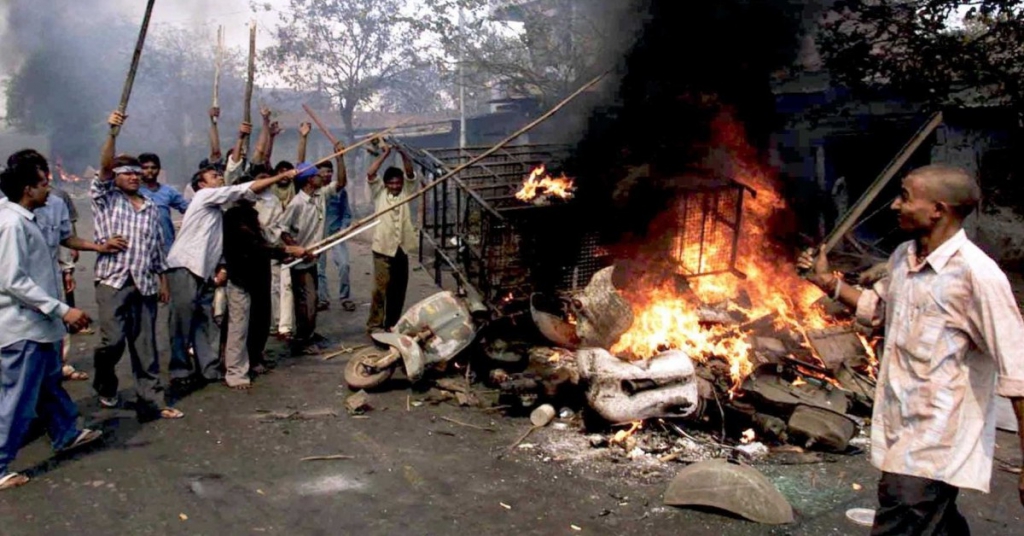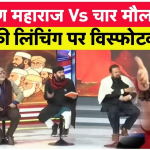
The 2004 Best Bakery Judgement and Its Significance Zahira Habibullah Sheikh v/s State of Gujarat, Delivered by the Supreme Court of India, April 12, 2004
01, Dec 2017 | Vandita Khanna
Out of the miseries of the Gujarat carnage of 2002, thanks to the courage of the survivors and the tenacious work of the CJP core legal team, has emerged path-breaking jurisprudence on state accountability, victimology and witness protection. Thirteen years after the Supreme Court (SC) delivered the famed Best Bakery verdict, this judgement remains among the most cited and used by individual citizens and the human rights movement. This case was spearheaded through the courts by the Citizens for Justice and Peace, Mumbai. This is a Judgement Primer that outlines crucial aspects of the judgement.
The night of March 1, 2002 witnessed the unruly burning of Best Bakery at Vadodara, one of the many ghastly alleged retaliations to the Sabarmati Coach S-6 fire. Zahira, the main eye-witness of the gruesome incident, is the first appellant in the case of ZahiraHabibullah Sheikh v. State of Gujarat,[1] which serves as the first grave condemnation of the possibly collapsing criminal justice system in India by one of its own at the apex court. In so doing, the two judge Bench of the Supreme Court, comprising of Doraiswamy Raju and Dr. Arijit Pasayat, JJ., raises important questions relating to the role of the court, the public prosecutor, investigating agencies, and the State in a criminal proceeding. State-sanctioned and sponsored criminal bouts of communal violence pose the unique problem of the State prosecuting the State, and in extension, every officer of the prosecuting State undertaking every effort to ensure the acquittal of accused officers of the State. Zahira Sheikhv v/sState of Gujarat then is relevant to acknowledge a phenomenon pervaded by official bias, chart the gravity of its implications on criminal jurisprudence, and succinctly identify the normative role of various State instrumentalities to revamp the collapsing system of criminal justice in India.
Critical to this note is a characterization of the significance of the judgment that is beyond declaratory and symbolic to one that has been crystallized into concrete interventions in law, policy and jurisprudence. In a time shadowed by religious fundamentalist awakenings, one recognizes the injection of judicial rationality and integrity in a theorization of communal violence that refuses to blur the lines between religious prescriptions and criminal offences. In locating religious fanaticism as outside the purview of religion, the Supreme Court stands its ground in declaring communal violence purportedly in the name of a particular religion to not only be criminal but also religiously reprehensible.[2] The 2004 judgment is one that has uniquely spoken truth to (political) power in calling out the arbitrariness and impropriety in the application of judicial mind by the High Court of Gujarat, deliberate laxity in investigation and prosecution, and lack of political will by officers of the State who were complicit in, if not actively at the helm of planning and executing, the Best Bakery fire.
Firstly, the Supreme Court concretized its reprimand of the faulty, perfunctory, biased and mala fide investigation, which was done ostensibly with the object of enabling the acquittal of the accused persons, in the form of a direction to the DGP Gujarat to monitor the re-investigation, if any, to be taken up with utmost sincerity.[3]Deficiency in investigation, as was the case in the present situation, has been essentially held to be a ground for re-investigation in subsequent decisions.[4]
Secondly, the Court also recognized that the Public Prosecutor failed to do the bare minimum expected of him to fairly present the case of the prosecution,[5] and pertinently, allowed “affected persons” to suggest the name of a prosecutor that may be taken into consideration during appointment of another prosecutor for the re-trial under the jurisdiction of the High Court of Bombay.[6] The unusual set of factors (such as, the public prosecutor “…acting more as a defence counsel than one whose duty was to present the truth before the Court…”[7]) were noted as sufficient to allow witnesses and victims to have a say in the matter of such appointment. This has further been concretized in the form of the Code of Criminal Procedure (Amendment) Act, 2008, which vests the Court with the power to “permit a victim to engage an advocate of his choice to assist the prosecution”.[8]
Thirdly, the Supreme Court directed scathing remarks towards the conduct of the State government, referred to as the “modern day Neros”,[9] in blatantly noting that
“Those who were responsible for protecting life and properties and ensuring that investigation is fair and proper seem to have shown no real anxiety[,]…were looking elsewhere when Best Bakery and innocent children and helpless women were burning, and were probably deliberating how the perpetrators of the crime can be saved or protected…”[10]
Cases prior to this have strategically evaded questions of State responsibility in acts of communal violence on the ground. Zahira Sheikh’s decision is the first in line that obligates the judicial criminal administration system to be “kept clean and beyond the reason of whimsical political wills or agendas and properly insulated from discriminatory standards or yardsticks of the type prohibited by the mandate of the Constitution.”[11] Essential extracts from this portion have been used extensively in the petitions filed by Zakia Jafri and Citizens for Justice and Peace before the High Court of Gujarat demanding the establishment of a chain of command responsibility and breach thereof by high-level State officials during the post-Godhra carnage.[12]
The judgment is a comprehensive contributor to the existing corpus of fair trial jurisprudence; conceptualizing fair trial through the familiar triangulation of interests of the accused, victim and society allowed the judiciary to privilege the position and role of the victim in a trial otherwise always tilted towards protecting the rights of the accused.[13] Discovery, vindication and establishment of truth,[14] instilling of public confidence in the justice delivery system,[15] and effectively doing justice were held to be paramount considerations during a criminal trial.[16] Such foregrounding enabled the Court to subsequently condemn the conduct of the High Court of Gujarat for blatantly disregarding sound jurisprudential principles of fair investigation, fair prosecution, fair trial and witness protection. Courts are not meant to be mute spectators who are blissfully ignorant of dereliction of official duty in the face of vexatious investigating and prosecuting conduct.[17] The judgment critically invokes the inquisitorial role of Courts to be “circumspect in evaluating the evidence”,[18] actively participate in the evidence collecting process instead of adopting an attitude of total aloofness and throwing hands in the air in despair.[19] An acquittal made out because of deliberately faulty investigation, evidence-gathering and prosecution cannot be considered an acquittal in the eyes of law[20]; “decency, decorum and judicial discipline should never be made casualties by adopting such intemperate attitudes of judicial obstinacy”.[21]Moreover, Doraiswamy Raju and ArijitPasayat, JJ.’s righteous decision has fortunately lent moral (and judicial) courage to future benches to reprimand judicial dereliction in upholding the majesty of the law.[22]
An overarching goal of the criminal justice system was held to be to protect the eyes and ears of justice, that is witnesses of the commission of an offence. Particularly, “if the witness himself is incapacitated from acting as eyes and ears of justice, the trial gets putrefied and paralyzed, and it no longer can constitute a fair trial”.[23]The Zahira Sheikh judgment expressly recommended legislative intervention to emphasize the prohibition against tampering of witness, victim or informant.[24]The judicial text has made future benches acutely aware of the widespread malady of hostile witnesses, culture of compromise[25] and, in extension, subversion of the criminal justice system by pressure and temptation.[26]The case of Zahira Sheikh held it to be the prerogative of the State to protect witnesses especially in cases involving “those in power, who have political patronage and could wield muscle and money power, to avert the trial from getting tainted and derailed and truth becoming a casualty”.[27] Safe and secure depositions without fear of threats to life, liberty and property were held to be fundamental in preventing incapacitation of justice. Witness protection programmes in the United Kingdom, Australia, Canada and USA were referenced to provide transnational precedent for combatting the alarming rate of “somersaults by witnesses”.[28] In this particular case, the Supreme Court entitled the complainant with a choice in the matter of selecting an independent Public Prosecutor during the retrial in the State of Maharashtra and imposed a duty on the States of Maharashtra and Gujarat to provide necessary protection to all witnesses during the course of the trial.
Subsequently, the Code of Criminal Procedure (Amendment) Act, 2008 defined a victim to be a “person who has suffered any loss or injury caused by reason of the act or omission for which the accused person has been charged”;[29] and guaranteed such victim a right to prefer an appeal against any order passed by the Court.[30] Victim protection, representation, rehabilitation and compensation have all been similarly recognized in subsequent case law.[31] The Zahira Sheikh judgment has significantly bolstered civil society initiatives for the institutionalisation of a witness protection programme,[32] a robust scheme for reparation and relief[33] codified in a legislation that expressly recognizes and provides mechanisms to enforce victim rights.[34] In this manner, Zahira Sheikh v. State of Gujarat,by enunciating principles critical to the delivery of criminal justice in India, has had far-reaching implications for a progressive victimology jurisprudence and provides hope for an eventual reworking of an impartial, independent and competent criminal justice machinery in cases of communal violence specifically and criminal offences generally.
The entire judgment may be read here:
| Help CJP Act on the Ground: Citizens Tribunals, Public Hearings within Communities, Campaigns, Memoranda to Statutory Commissions, Petitions within the Courts. Help us to Act Now. Donate to CJP. |
References:
[1](2004) 4 SCC 158.
[2]Id. at 66.
[3]Id. at 78.
[4]See BharatiTamang v. Union of India, (2013) 15 SCC 578.
[5]See also Manu Sharma v. State (NCT of Delhi) (2010) 6 SCC 1.
[6]Supra note 1, at 76.
[7]Id. at 68.
[8]Section 24(8), Code of Criminal Procedure, 1973.
[9]Supra note 1, at 69.
[10]Id.
[11]Id. at 68.
[12]“Timeline: Zakia Jafri vs Modi in 2002 Gujarat riots case”, Hindustan Times (Dec 26, 2013), available at: http://www.hindustantimes.com/india/timeline-zakia-jafri-vs-modi-in-2002-gujarat-riots-case/story-QDDWYZwlGgn3we3RsATthP.html.
[13]Supra note 1, at 35.
[14]Id. at 30.
[15]Id. at 35.
[16]Id. at 54.
[17]Id. at 35.
[18]Id. at 61.
[19]Id. See also Mina LalitaBaruwa v. State of Orissa (2013) 16 SCC 173.
[20] See also Dayal Singh v. State of Uttaranchal (2012) 8 SCC 263.
[21]Supra note 1, at 64.
[22] See Patel MaheshbhaiRanchodbhai v. State of Gujarat, (2014) 14 SCC 657.
[23]Supra note 1, at 41.
[24]Id. at 42.
[25] See Ramesh v. State of Haryana (2017) 1 SCC 529.
[26] See for e.g. State v. Sanjeev Nanda (2012) 8 SCC 450.
[27]Supra note 1, at 41.
[28]Id. at 57.
[29] Section 2(wa), Code of Criminal Procedure, 1973.
[30]Id., at section 372.
[31]RudulSah v. State of Bihar, (1983) 4 SCC 141; Sarwan Singh v. State of Punjab, (2005) 140 PLR 433; Balraj v. State of U.P., (1994) 4 SCC 29; BalasahebRangnathKhade v. State Of Maharashtra &Ors, 2013 ALL MR (Cri) 1153; JagmohanBhola v. DilbaghRaiBhola&Ors. CRL.A. 793/2010 dated 24.01.2011; Guru Prasad Yadav v. State of Bihar &Ors. CR. APP (DB) No.582 of 2011; State of Gujarat v. SukhdevbhaiBhikhabhai, R/CR.MA/4334/2013.
[32]TeestaSetalvad, “Yet Again, the Supreme Court Raps the Indian State on Witness Protection, But is Anyone Listening?”, Sabrang (Nov 28, 2016), available at: https://sabrangindia.in/article/yet-again-supreme-court-raps-indian-state-witness-protection-anyone-listening.
[33]Sections 87-91, Prevention of Communal and Targeted Violence (Access to Justice and Reparations) Bill, 2011.
[34]Id., at sections 83, 84.









